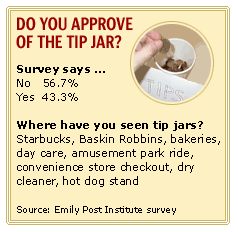
NEW YORK (CNN/Money) -
Most people, if asked, will tell you a tip is meant to reward good service. But a lot of those same people will tip the same amount no matter what kind of service they get.
I know I have. As steamed as I can be when service is poor, I almost never can work up the gumption to stiff someone on the tip or to leave a miserly amount.
Why is that? Apparently, because as Americans we're neurotic, guilt-prone, and we don't want to be thought of as cheap or ignorant. At least those are some of the reasons that Cornell professor Michael Lynn has found in his 20 years of research on tipping behavior.
"The major reason people tip," said Lynn, "is to avoid social disapproval."
So much for rewarding good service.
In fact, Lynn, found that how customers rate service has a very small effect on the amount they choose to tip in restaurants. About 4 percent of the variability in tip size is due to their rating of the service provider, his research revealed. That's the same level of variability that the sun has on tip size. (Folks tend to tip more on sunny days.)
It also has been argued, Lynn said, that our willingness to tip regardless of service reflects a sense that the customer is in a better position financially than the server and wishes to avoid incurring the server's envy. A tip, then, is "a payment to reduce that envy," Lynn said.
It's also a way for the equality-minded to feel less guilty about being served. Looking across cultures, he has found that tips tend to be higher in countries where there is greater neuroticism about and intolerance of ambiguous situations.
Tip as incentive?
Psychosocial theories aside, though, there's another we reason tip. It's part of the cost of being served. If you think tipping is truly optional at restaurants, hair salons and hotels, I've got a bridge I'd like to sell you.
Tipping is expected. It's part of your bill, except that you need to do the math. (Personally I wish restaurant owners would pay table servers a living wage so they wouldn't rely so heavily on my tips for income. But then, the argument goes, owners would raise menu prices and lower-income families couldn't afford to eat out.)

Tipping experts recommend you tip a waiter or waitress 15 percent for adequate service, 20 percent for very good service and not less than 10 percent for very bad service. Why 10 percent for a bad time? Think of the busboys, the bartender and the hostess. In a lot of restaurants, a waitress pays out a percentage of her tips to others who help her serve you. By punishing her, you're punishing them.
You might think of the waitress, too. It's possible, just possible, the poor service you received was not really her fault. Maybe the kitchen was backed up or she was given too many tables to cover.
If you want to help cure bad service, rather than skip the tip, speak to the manager about the server's behavior or about what was wrong with your dinner, Lynn said.
So, what about that stupid tip jar?
I am not a fan of filling coffers at the coffee counter. When someone's serving me something that I could get myself but for the counter (and the line) between us, I don't consider it a convenience worth paying extra for.
Tipping experts agree with me on this one. There's no need to leave anything in the tip jar -- it's completely optional. If you're so moved to drop some change in, go crazy. If not, enjoy a guilt-free day.
Jeanne Sahadi writes about personal finance for CNN/Money. She also appears regularly on CNNfn's "Your Money," which airs weeknights at 5 p.m. For comments on this column or suggestions for future ones, please e-mail her at everydaymoney@cnnmoney.com.

|

